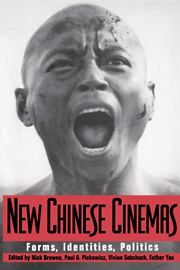Book contents
- Frontmatter
- Contents
- List of Illustrations
- List of Contributors
- Acknowledgments
- Note on the Romanization of Chinese
- Introduction
- I FILM IN THE PEOPLE'S REPUBLIC
- II FILM IN TAIWAN AND HONG KONG
- 5 Remapping Taipei
- 6 The Ideology of Initiation
- 7 The Return of the Father
- 8 Border Crossing
- 9 Two Films from Hong Kong
- Chronologies
- Glossary
- Scholarly Works on Chinese Filmmaking in the 1980s
- Index
6 - The Ideology of Initiation
The Films of Hou Hsiao-hsien
Published online by Cambridge University Press: 05 June 2012
- Frontmatter
- Contents
- List of Illustrations
- List of Contributors
- Acknowledgments
- Note on the Romanization of Chinese
- Introduction
- I FILM IN THE PEOPLE'S REPUBLIC
- II FILM IN TAIWAN AND HONG KONG
- 5 Remapping Taipei
- 6 The Ideology of Initiation
- 7 The Return of the Father
- 8 Border Crossing
- 9 Two Films from Hong Kong
- Chronologies
- Glossary
- Scholarly Works on Chinese Filmmaking in the 1980s
- Index
Summary
Five films by Hou Hsiao-hsien (Hou Xiaoxian) before his magnum opus City of Sadness [Beiqing chengshi, 1989] deal with initiation in one way or another. The five are The Boys from Fengkuei [Fenggui lai de ren, 1983], A Summer at Grandpa's [Dongdong dejiaqi, 1984], A Time to Live and a Time to Die [Tongnian wangshi, 1985], Dust in the Wind [Lianlian fengchen, 1987], and Daughter of the Nile [Niluohe nüer, 1987]. This short essay examines the various aspects of initiation as represented in these five films.
The term “initiation” was used by U.S. New Critics Cleanth Brooks and Robert Penn Warren in their comments on Ernest Hemingway's “The Killers” and Sherwood Anderson's “I Want to Know Why” in the pioneering textbook Understanding Fiction. Brooks and Warren used the term to describe a theme and to classify a type of short story. Other formalist critics adopted this usage from the 1940s through the 1970s. Entire anthologies and portions of anthologies have been organized around the initiation theme for pedagogic purposes.
This formalist discussion and anthologizing over a forty-year period established a fictional genre or subgenre based on the initiation theme. Among the definitions of this theme, perhaps the most encompassing is that given by Isaac Sequeira, who takes into consideration the diverse emphases and the minor variations of the different critics:
Initiation is an existential crisis or a series of encounters in life, almost always painful, with experience during which the adolescent protagonist gains valuable knowledge about himself, the nature of evil, or the world. […]
- Type
- Chapter
- Information
- New Chinese CinemasForms, Identities, Politics, pp. 151 - 159Publisher: Cambridge University PressPrint publication year: 1994
- 4
- Cited by



